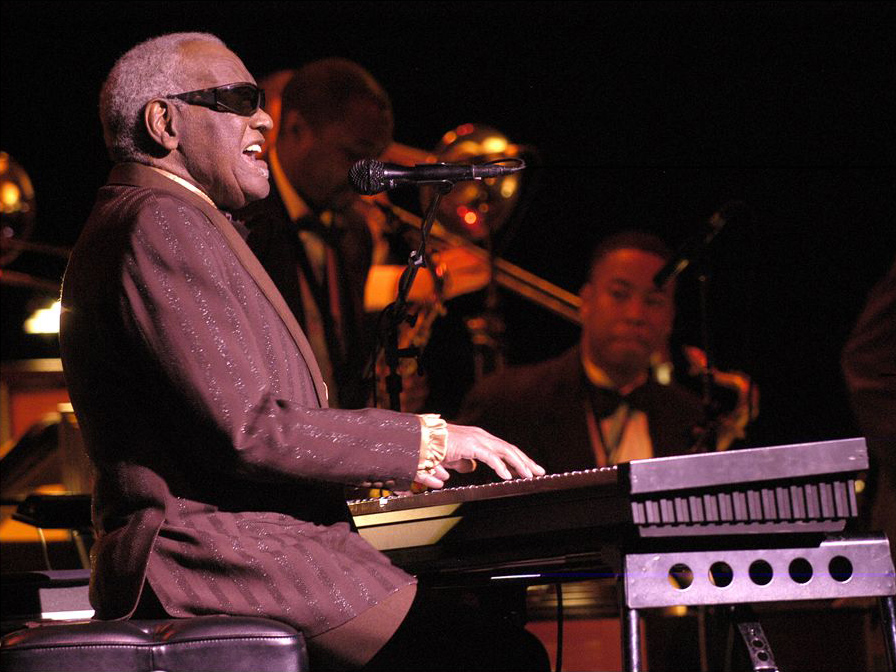Ray Charles: The Genius
10/26/20256 min read


Ray Charles: The Genius Who Saw Music Where No One Else Could
There's something hauntingly beautiful about imagining a seven-year-old boy losing his sight completely and, at the same time, gaining something few would possess in an entire lifetime: the ability to see music in a way that transcends any visual perception. Ray Charles Robinson didn't just lose his eyes to glaucoma – he gained ears that would redefine the sound of entire generations.
(And I confess, I've always wondered: didn't that absolute darkness force him to create a sonic universe so vivid it became more real than anything we could ever see?)
The Boy Who Read Music in Braille
When Ray Charles entered the Florida School for the Deaf and the Blind in 1937, at just seven years old, no one could have predicted that this poor, blind Black boy would become "The Genius" – a title he despised, preferring the modest "Brother Ray." But there, between the raised dots of Braille sheet music, something extraordinary was happening.
The technique was brutal in its complexity: read with your right hand the movements of your left hand on the piano, then completely reverse the process, and finally merge both parts in your mind before playing a single note. Imagine learning Bach, Mozart, and Beethoven that way. It's like assembling a three-dimensional puzzle in the dark – literally.
But Charles wasn't just learning classical music. He was absorbing structures, harmonies, progressions that he would later dissect and reconstruct in ways that would horrify purists and send audiences into ecstasy.
The Two Great Tragedies
In the spring of 1945, when his mother Aretha Robinson died, Ray was only 14. He had already lost his younger brother years earlier, drowned while he watched, helpless. These "two great tragedies," as he would later call them, shaped not just his music but his philosophy: pain isn't something to be avoided, it's raw material.
How many of the tears in "Georgia On My Mind" came from that deep well of loss?
The decision to leave school after the funeral wasn't rebellion – it was survival. Some learn by reading books; others read the streets, the smoky jazz bars, the endless nights on the dusty roads of the segregated South.
Inventing a Genre (Because the Existing Ones Were Too Small)
Here's the fascinating part: Ray Charles didn't create soul music out of artistic ambition or manifesto declaration. He simply couldn't fit into any existing box.
In the 1950s, working for Atlantic Records meant being at the epicenter of the rhythm and blues revolution. But Charles looked at that scene – or rather, heard that scene – and thought: "What if I mixed the fervor of the gospel I heard in church with the lament of the blues I felt on the streets and the sophistication of the jazz I studied in Braille?"
The answer was a fusion as controversial as it was irresistible. Critics at the time were scandalized: was he secularizing the sacred? Profaning church music to make money?
Actually, he was doing something more subversive: proving that the line between sacred and profane had always been artificial. The same pain that makes a man cry out for Jesus makes another cry out for lost love. The emotional intensity is identical – only the recipient changes.
The Man Who Said "No" to Industry Standards and Conquered the Impossible
When Ray Charles negotiated total artistic control with ABC Records in the 1960s, he did something almost unthinkable for a Black artist in that era: he demanded complete autonomy. This in an age when the industry treated Black musicians as interchangeable commodities, where talent was extracted and credit often stolen.
The result? Modern Sounds in Country and Western Music (1962) – an album so audacious it seemed insane. Ray Charles, the genius of soul and R&B, recording country music?
But here's the trick: he wasn't recording country music, he was translating country music into a universal emotional language. He took "I Can't Stop Loving You" and transformed it into a devastating confession that transcended race, genre, and geography. The album didn't just reach the top of the Billboard 200 – it demolished boundaries many thought were permanent.
The Numbers Speak (But Don't Tell the Whole Story)
Forty-four hits on the R&B charts. Eleven in the Top 40. Eighteen Grammy Awards (five of them awarded posthumously). Inducted into the Rock & Roll Hall of Fame in 1986 as one of the first members. Number 2 on Rolling Stone's list of the 100 Greatest Singers of All Time.
Impressive? Yes. Sufficient? Not even close.
Because statistics don't capture the moment when "Georgia On My Mind" became Georgia's official state song in 1979, despite being written in 1930 by composers who never set foot in the South. Numbers don't explain how Billy Joel could say, without fear of sacrilege, that Ray Charles was more important than Elvis Presley.
The Influences That Shaped a Genius
Ray Charles was religious about his musical heroes. Nat King Cole topped the list – that velvety voice, that impeccable diction. But there was also Louis Jordan, with his infectious jump blues, and Charles Brown, with his melancholy ballads drenched in blues.
His friendship with Quincy Jones lasted decades, an occasional partnership that extended beyond music into the territory of genuine brotherhood. Jones understood something fundamental about Charles: the man wasn't trying to be different, he was being authentic in an industry that demanded conformity.
Come to think of it, maybe that's why Frank Sinatra called him "the only true genius in show business." Sinatra, who wasn't exactly generous with compliments, recognized a peer when he saw one – someone who refused to let format define content.
The Legacy That Keeps Vibrating
When Ray Charles passed away, he left behind something more valuable than awards or fortunes: he left a method. An approach that told artists: you don't have to choose between authenticity and commercial success. You don't have to sound like radio expects. You can fuse unlikely influences. You can make country sound like soul and gospel sound like blues.
The 1987 Grammy Lifetime Achievement Award was fair. The posthumous induction into the Country Music Hall of Fame in 2022 was poetic – the man who broke the barriers finally recognized by those he forced to rethink their own boundaries.
But perhaps the most significant tribute is this: every time a contemporary artist fuses genres without asking permission, every time someone takes a "white" song and reinterprets it with "Black" soul (or vice versa, because these categories were always artificial too), they're walking on a trail that Ray Charles paved with sweat, tears, and pure musical genius.
The Essential Discography (With Some Hidden Gems)
"The Genius After Hours" captures Charles in intimate, almost meditative mode – the kind of album you put on at three in the morning when you need company but not conversation.
"Modern Sounds in Country and Western Music" remains revolutionary decades later. Listen carefully: each arrangement is a masterclass in how to respect the essence of a song while completely rewriting it.
And "Georgia On My Mind"? That deserves its own paragraph. Technically, it was his first of three number-one songs on the Billboard Hot 100. Emotionally, it's a love letter to a place (or is it a person? an idea? a lost time?) that manages to be specific and universal at the same time. Stuart Gorrell and Hoagy Carmichael composed it in 1930, but it didn't become real until Ray Charles bled over the notes thirty years later.
The Man Behind the Legend
Here's something rarely discussed: Ray Charles was deeply averse to the title "The Genius." He understood that genius, when proclaimed, becomes performance. He preferred "Brother Ray" – something democratic, accessible, human.
This humility wasn't false modesty. It came from someone who knew his own flaws and struggles intimately. A man who lost his sight at seven doesn't need anyone telling him how special he is – he knows exactly how ordinary pain can be and how extraordinary it is to survive it.
So, what really makes Ray Charles unforgettable?
It's not the awards (though they validate). It's not the sales statistics (though they impress). It's this: he proved that limitations can be portals. That blindness can be vision. That musical genres are just suggestions, not commandments.
Every time you hear a song that shouldn't work – country mixed with soul, gospel fused with blues, jazz interwoven with pop – you're hearing the echo of a blind boy from Georgia who decided that rules were just the starting point.
And if you still don't understand why Billy Joel considers him more important than Elvis, put on "Georgia On My Mind" and close your eyes.
Really, close your eyes.
Maybe it's the only way to see what Ray Charles always saw: music that transcends everything else.
